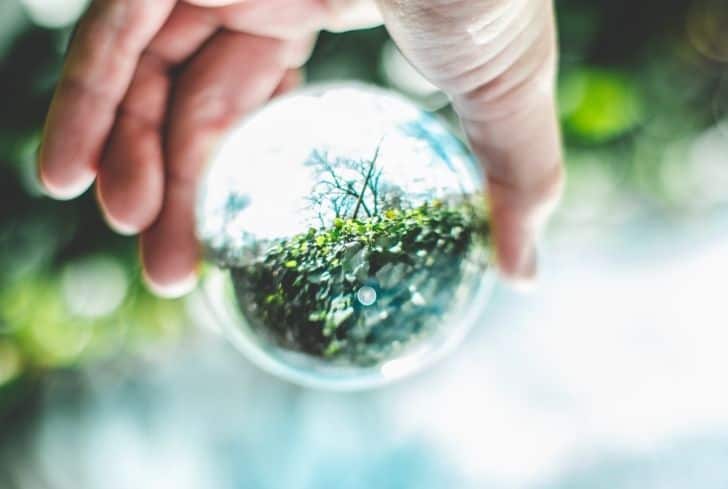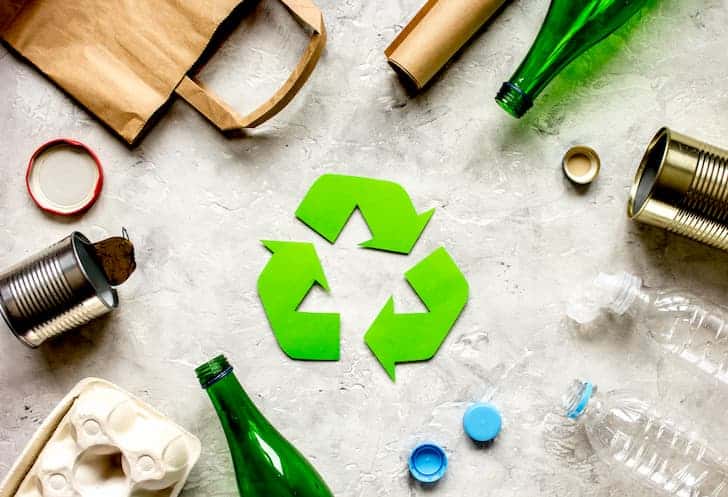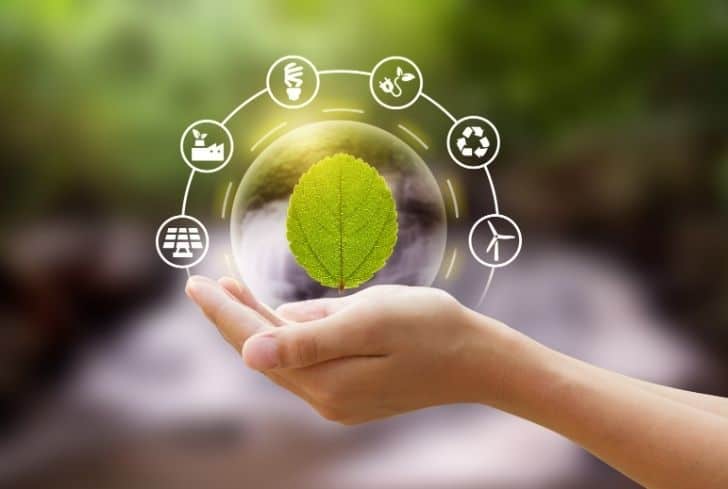According to the EPA, the average American person will produce about 5.91 pounds of trash, with about 1.51 pounds being recycled; 4.40 pounds is the rough average daily waste per person. Multiplying that with over a hundred million gives us lots of money spent, too much fuel and resources used and a lot of waste per individual.
Take a minute and think of the waste you produce on average, from plastic paper bags to water bottles. Think about the coffee mugs you use and throw away. Think about the paper towels you use once and discard them.
Imagine the package involved in every product you are using. Now multiply that with over a hundred million other people. Perhaps it’s the reason the infamous trash island exists and it’s also the reason there are over 1500 landfills in the United States alone.
What people across the globe need to remember is that change begins from within and by individual action. So, how can the planet reduce the million pounds of material produced annually? Let’s take a look at 21 super easy ways to live a zero-waste lifestyle.
21 Super Easy Ways to Live a Zero Waste Lifestyle
1. Buy products in bulk
Many people may be wondering what this will solve but surprisingly, the logic behind it is amazing. Every time you go to the store, they have to package the products bought.
If you shop every week, for instance, that is around four disposable bags in a month. If you shop in a bulk, however, that is just one disposable bag.
People should therefore look for bulk stores around them. These are the ones that sell products in sacks and barrels. Things like cereals have a very low perishable rate.
Instead of buying a pound of oats from the store, one can buy sixty pounds of it in one sack instead. It reduces the number of trips to the store and the number of waste, especially plastic, that one produces.
2. Take your own containers
In the case of products that cannot be stored in sacks, bulk stores allow you to bring your own containers and jars. Containers can be used to store oils and jars for pastes and jams.
These containers and jars can just be washed and reused anytime the product runs out. It’s just a matter of ensuring you know the volume of your jar or container. Also, the use of specific containers and jars for specific products is essential to ensuring the products don’t go bad easily.
3. Replace plastic bags with reusable cloth bags
Plastic bags create a lot of problems and plastic pollution to the ecosystem because they do not decompose. They clog waterways, are a menace in parks and are problematic to us and our animals.
Disposable plastic bags are simply too many to recycle and most of them come from shopping as they are used to wrap or package at the checkout. Instead, you could invest in different sizes of cloth bags that are reusable. They can be bought or made from old clothes.
4. Replace disposable paper towels with cloth towels
You may think to yourself that paper towels do no harm since they are biodegradable but the fossil fuels used in producing and transporting them are not exactly environment friendly.
In the kitchen, you can invest in dishtowels and in the dining room, some napkins can be quite effective. As opposed to disposable paper towels, the clothe ones can be used over and over again for an extended period because they only need washing after use.
5. Reuse or replace aluminum foil
It might come as a shocker to most people but aluminum foil can be washed and reused. Most just go ahead and buy some more after it is finished. Alternatively, one can replace aluminum foil with a glass Pyrex pan in roasting.
It is actually healthier for both the environment and you as it doesn’t react with your food to leek aluminum in the food. In storing food, it is healthier to store it in reusable glass or plastic food containers.

6. Ditch the plastic coffee mug
In western countries, plastic coffee mugs are becoming a real problem, especially in high-production states and towns. Instead of helping a landfill fill up, you can buy your own coffee mug. There are even those that are actually thermos mugs with metal casings so that they do not break.
7. Stop using the Q tips (Cotton buds)
The plastic at the center of a cotton bud is not biodegradable. Cotton buds are being used at a very fast pace which is creating a menace for the environment.
Besides, their usage is totally inappropriate because if you value your health, you will know you need the wax in your ears. Instead of using the cotton buds, just wash your ears with a clean cloth and leave it at that.
8. Invest in multipurpose soaps
Instead of buying so many products for different but related functions, just buy a multipurpose product. Usually, when you go to the store you will buy handwashing soap which will be in a plastic bottle dispenser and a shower liquid body wash which is in a plastic bottle.
As an alternative, you can buy a single multipurpose soap and reduce the waste. They double as a dish cleaning and hand cleaner soap.
9. Make your own cleaning products
Most cleaning products in the market are toxic to both you and the environment. The disposable containers that are needed for the various cleaning products are ridiculous and the chemicals used are high off the charts.
So, why not make your own? There is nothing disposable about it and your respiratory system will thank you. You just need a quarter cup of bicarbonate or baking soda, half a cup of vinegar, two liters of water and a few drops of tea tree oil for fragrance. If you think about it, it actually saves you money and since there is no waste, it is great for the environment.
10. Being a digital age, stop buying newspapers
The paper newspapers may be biodegradable but they take time to decompose thereby cluttering the environment. Furthermore, more trees as used as raw material for paper.
Instead of hardcopy, you can manage your subscriptions online. If you follow a newspaper on Twitter, for instance, you can have a look at that day’s content.

11. Stop the magazine clutter
Just like in newspapers, you can get a digital subscription to your favorite magazines. Alternatively, you can download magazines, usually in PDF, into your phone or iPad where you can view them anytime you like.
12. Buy your own water bottle
Is it really necessary to buy that bottle of water each day and add three hundred and sixty-five non-biodegradable plastics into the landfill each year?
Here is a better idea; you could just buy one water bottle to carry your water everywhere you go. Besides, if you take a lot of water, you can buy a larger volume water bottle and you are sorted.
13. Go back to the kitchen
Do you know how much waste you save by making your own food or beverage? Instead of buying a plastic bottled juice, why not just blend or use a juicer?
Instead of ordering takeout that comes with disposable waste, why not cook a proper meal and use plates and cups that can be washed and reused? You will be reducing the amount of waste greatly if you instead take time to learn cooking for yourself.
14. Learn how to package preserves
Instead of buying jams, sauces and pastes from the store each time you run out, you can take a look at some survivalist and prepper blogs for preserving recipes and packaging using various methods including water bath canning.
15. Take a look around the farmer’s markets around you
Farmers’ markets sell things in bulk which is a good thing. The environment is also protected from waste when you bring your own packaging and it also promotes healthy living since you get to know the person and place where your food comes from.

16. Replace the diapers with the old fashioned nappies
Is there a garbage truck that is not filled with diapers these days? If you have never noticed, the casing of a diaper is plastic and since they are disposable, they are causing a major menace since their invention.
We may opt for diapers because we do not have to wash them, but at what price does our discomfort come? The environment suffers, the reproductive health of our baby boys is affected and the chemicals in them cause rashes. We can use nappies and reusable plastic covers or pants to cover the nappies.
17. Replace facial wipes with handkerchiefs
Some may be made from recycled paper but would you lack face wipes in a landfill? The answer is NO as there are thousands of facial wipes in the landfill. So, go old-fashioned by using a handkerchief which you can wash anytime, dry and reuse.
18. Take a look at returnable containers
Instead of disposables, you may opt for returnable containers. They come in various sizes from sleeve packs to cardboard boxes, to bulk boxes for large items.
19. Invest in organic disposables
Toothbrushes are disposed of on a three-month basis if not sooner, where most are plastic. You can instead opt for decomposable bamboo toothbrushes.
20. Learn to reuse
A disposable product can be reused in the area it was used in before or used in a totally different area. For example, an old toothbrush can be used to clean the keyboard of a laptop. Old clothes can be made into washing and wiping rugs.
Cardboard boxes can be used as the ceiling in a treehouse and worn-out brushes can be used to wash the pets. Before you throw away something, ask yourself if you might need to repurpose it.
21. Just buy what you need
Take your shopping list and ask yourself what you would do without if the economy was tight. Would you really need the makeup removal kit when you can just use a towel, warm water and gentle soap?
Do you really need disposable cups and plates for a party for twenty people? Do you really need all the body products you use on a daily basis? Most waste tends to come from the kitchen and bathroom, take a look and decide what your contribution to the environment can be.






